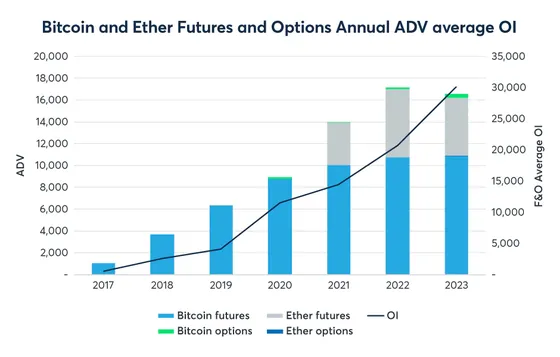Bitcoin (BTC) and Ethereum (ETH) futures held by derivatives giant Chicago Mercantile Exchange (CME) saw record participation from major traders in the second quarter. Meanwhile, altcoin projects XLM, XRP and Solana-based funds are increasing. Here are the details…
Bitcoin and Ethereum saw record participation
The CME said the number of large open interest holders or organizations holding at least 25 Bitcoin futures contracts averaged 107 in the second quarter. The average of Ethereum’s so-called large open interest holders was 62 in the second quarter. “Institutional interest in bitcoin futures continued to increase throughout the quarter as investors sought regulated venues/products to hedge from increased market volatility and manage risk and exposure,” the exchange said, explaining strong participation from major traders.

The Commodity Futures Trading Commission (CFTC) regulates CME futures. The standard Bitcoin futures contract is equivalent to 5 BTC, while the micro contract is one-tenth the size of 1 BTC. Standard ETH futures have a contract size of 50 ETH, while micro futures are equivalent to one-tenth of 1 ETH. CME’s regular and cash-settled futures have long been the preferred option for institutions seeking exposure without having to own cryptocurrency.
First quarter rally determined investor moves
The record turnout by big holders came as top cryptocurrencies expanded their first-quarter rally. cryptocoin.com As we reported, Bitcoin increased by 7 percent in the three months to June, confirming its 84 percent increase in the first half of the year. Altcoin ETH, on the other hand, gained 61 percent in the first six months. CME said that demand for hedging instruments drove trading volumes and open interest in BTC and ETH futures and options to all-time highs in the first half.

Trading volume refers to the number of contracts traded on a given day. Open position refers to the number of contracts active at any given time. An increase in the open position represents the flow of new money into the market. Open interest on standard Bitcoin futures contracts broke a record with an average of 14,800 contracts in the first half, an increase of 15 percent compared to 2022. Meanwhile, open interest in Bitcoin options confirmed an impressive 175% increase compared to 2022, with an average of 9,400 contracts.
XRP, XLM and SOL draw attention
Institutional investors, on the other hand, have increased their allocations to XRP, Stellar’s XLM and Solana’s SOL-based products this year, even as market sentiment remains moderate overall and remains tied to Fed hikes. A new report by CCData shows that investments in XLM-based products increased by 62.7 percent to $17.3 million in assets under management (AUM), a significant increase in Grayscale’s XLM product recording a premium of over 330 percent. In addition, XRP and SOL-based products rose 33.2 percent and 55.7 percent, respectively, to $65.7 million and $87.8 million in AUM.

In terms of product volumes, however, ProShares’ Bitcoin Strategy ETF (BITO) dominated volumes with $179 million in average daily volumes, up 2.96 percent from June. Grayscale’s bitcoin (BTC) and Ethereum (ETH) trust products followed with average daily volume of $83.0 and $31.0 million, up 29.7% and 60.4% respectively. Earlier this month, a US judge brought some joy to XRP by ruling that the sale of XRP tokens on exchanges does not constitute investment contracts. The decision was a partially positive outcome for Ripple Labs, which has been in a legal battle with the US Securities and Exchange Commission (SEC) for nearly three years.
The decision also caused a surge in SOL, Cardano’s ADA, and other altcoins as traders likely viewed XRP’s decision as a positive outcome for the crypto market. In the past few months, the crypto market has been subject to a wave of regulatory action as it tries to recover from last year’s downturn, particularly in the US. The SEC filed a lawsuit against Ripple in 2020, alleging that the firm was selling unregistered securities. Ripple has historically distanced itself from XRP, the token that powers some of its products and the XRP Ledger network. But any progress in the case clearly has an impact on XRP prices.







